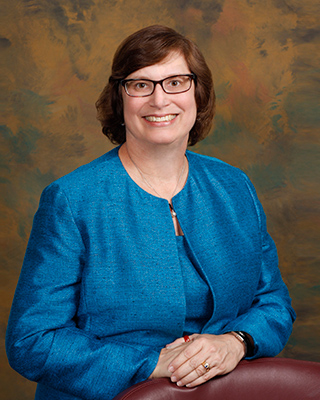February 2017 Member of the Month
Member of the Month: Erica Swegler, MD
Texas candidate for AAFP Board of Directors exemplifies service to her patients, her specialty, and her Academy
By Perdita Henry
posted 02.08.17
Few members have been as active and held as many leadership roles in TAFP, and served in just as many roles in AAFP, as Erica Swegler, MD. Looking at a list of her accomplishments and roles tells the story of someone who is dedicated to the betterment of Texas health care, committed to her community, and dedicated to her fellow family physicians. Advocacy on behalf of her patients and her colleagues color every aspect of Swegler’s career, and she’s nowhere close to slowing down.
Now running a private practice in the capital city, she has announced her candidacy for a position on the AAFP Board of Directors. I got a chance to speak with her about how advocacy has influenced her outlook on family medicine, why state-level influence through the TAFPPAC is where it’s at, and how volunteering for Physician of the Day kicked it all off.

How did you start working in advocacy after becoming a physician?
I volunteered to be Physician of the Day for the Legislature not realizing this was the initiation into my advocacy role. It just sounded like a neat thing to do. My continued participation in the event allowed me to develop first-name relationships with legislators. It especially made an impact during my legislator’s freshman year, when I was the only physician they had a chance to introduce on the floor of the senate. I then followed up by accepting invitations to things in my legislator’s district to have additional chances to interact with them.
You’ve announced your candidacy for a position on the AAFP Board of Directors. Congratulations! Why did you decide to run for the board and what would you like to accomplish should you win?
I decided to run for the Board of Directors because I feel I have a good understanding of alternative payment models and a skill subset that would be useful in this position. Furthering the implementation of alternative payment models and achieving appropriate value in the health care system for family physicians on a national level, would go a long way to provide the best care for our patients. I believe the work force issue is absolutely tied to the value proposition.
What does advocacy mean to you?
Advocacy to me is standing up for what you believe in and making sure that as a family physician you have the tools necessary to meet your patient’s needs.
Why is TAFPPAC important?
TAFPPAC is important because so many of the issues we face are state-level issues, such as the Medicaid payment system. Issues with the Texas Medical Board, rulemaking, and preventing bad laws from passing in regards to health care issues are all state-level issues that the PAC has brought attention to. I once heard a lawmaker say that "all the easy laws have been passed. Murder is already against the law, so everything else is hard work."
What do you find most fulfilling about your TAFPPAC work and what are the most memorable changes you have seen take place through advocacy?
The most fulfilling thing about my work for TAFPPAC is tied to two memorable things that have happened through advocacy. On the state level, it was setting limits on pain and suffering through a medical malpractice reform and helping this reform become a constitutional amendment.
There was a large amount of TAFP and Texas Medical Association leadership in Fort Worth and Tarrant County at that time and when you look at it, there was about a 3,500-vote swing in favor of the ballot initiative within that area. This allowed the entire constitutional amendment to pass. I think this happened because the physician leaders involved their patients on a grassroots level.
On a federal level the largest success has been repeal of the SGR, although that was a 15 to 20-year effort.
What do you think people get wrong about TAFPPAC?
I do not think, in general, physicians in practice, whether employed by a hospital system or independent, consider putting any money to what I would call research and development within their field. This needs to be considered by every physician as part of their cost of doing business.
Why is it important for family medicine physicians to participate in advocacy?
It’s important for family physicians to participate in TAFPPAC because much of what dissatisfies physicians about patient care comes from laws, rules, and regulations set by the state and federal government. A PAC allows us to have a unified voice and influence within the system to achieve the best outcome for our patients and our ability to care for them.
TAFP’s Member of the Month program highlights Texas family physicians in TAFP News Now and on the TAFP website. We feature a biography and a Q&A with a different TAFP member each month and his or her unique approach to family medicine. If you know an outstanding family physician colleague who you think should be featured as a Member of the Month or if you’d like to tell your own story, nominate yourself or your colleague by contacting TAFP by email at tafp@tafp.org or by phone at (512) 329-8666. View past Members of the Month here.